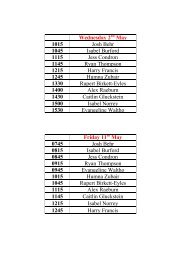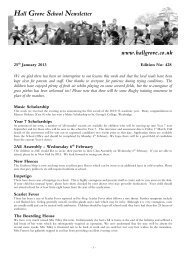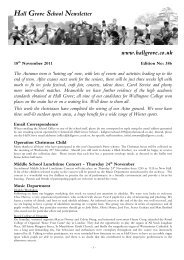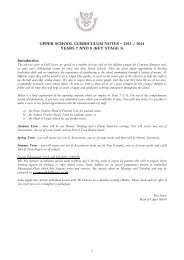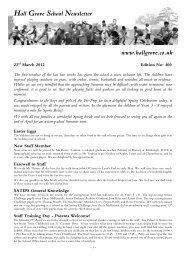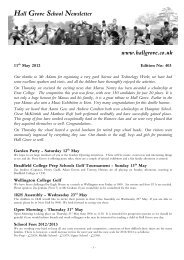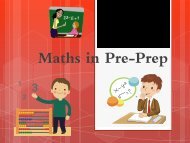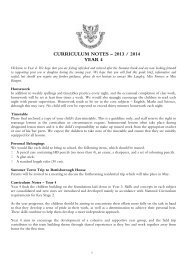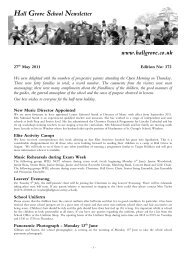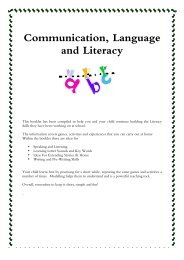Year 6 - Hall Grove School
Year 6 - Hall Grove School
Year 6 - Hall Grove School
You also want an ePaper? Increase the reach of your titles
YUMPU automatically turns print PDFs into web optimized ePapers that Google loves.
Latin<br />
Aims<br />
In the words of the Independent <strong>School</strong>s Examination Board, this course seeks<br />
1. to promote a firm understanding of the Latin language and<br />
2. to foster an interest in the Greek and Roman cultures that have shaped the modern world.<br />
People often ask: why study Latin? What relevance has it today?<br />
It certainly helps with other languages, offering a grounding in the vocabulary of medicine, botany, geology,<br />
science and law. Our politics, philosophy and law, music, literature and art, even our notions of sport, leisure<br />
and fair play are directly shaped by the Romans’ legacy. But these are secondary benefits.<br />
The analytical power and verbal agility required for Latin not only help us to understand English and to learn<br />
the romance languages, they also provide a rigorous training for understanding any sort of language, from<br />
scientific and legal jargon to computer programming.<br />
Latin trains the mind more than any other subject: it combines the discipline of crossword-solving with the<br />
dynamism of music, the flair of sport with the mental zest of arithmetic. If you love travelling, you might love<br />
Latin; if you love computer games, you will probably enjoy Latin; if you like maths, music or cricket, Latin<br />
may be for you.<br />
Assessment: Objectives and Practice<br />
Again in the words of the Independent <strong>School</strong>s Examination Board, pupils are expected to develop skills in:<br />
1. translation from Latin to English (including translation for comprehension questions answered in English);<br />
2. translation from English to Latin at an appropriate level;<br />
3. manipulation of basic grammar;<br />
4. non-linguistic studies, showing comprehension of topics from history and mythology.<br />
Work is assessed by the teachers. In language tasks, it is always worth putting down what one does know<br />
rather than giving up; it is even more worthwhile to think about what one has been learning recently and try<br />
to put that knowledge to use. In non-linguistic tasks, factual knowledge is the foundation and extra marks are<br />
awarded for fluent and well-planned expression, appropriate and competent illustration.<br />
Setting and Timetable<br />
There are three sets, each taught for four lessons of forty minutes a week.<br />
Prep<br />
Prep is set once a week. It is best practice for pupils to do the homework on the night it is set, but it will be at<br />
least 48 hours before the work is expected. Prep most often consists of exercises from the text book<br />
reinforcing work studied in class, but sometimes includes vocabulary and grammar to be learned, with<br />
occasional writing tasks (in English) to back up work on Greek Mythology and Roman culture.<br />
All students will have a text book. Often it is worth looking back over recent pages to solve the task in hand.<br />
If there is new vocabulary or grammar, why not learn it alongside completing the written exercise? The text<br />
book includes a vocabulary list in the back, so there is no need to buy a Latin dictionary, nor to look on<br />
translation websites. I can promise you that the pupils are better equipped to do their exercises than Google<br />
Translator, which copes poorly with Latin endings and produces nonsensical results.<br />
All learners have different styles, and we are always delighted to discuss how we can help our students. For<br />
absorbing vocabulary, some like flash cards, some post-it notes, some snap-style games, and some MP3<br />
recordings.<br />
Syllabus<br />
The majority of the pupils will be leaving <strong>Hall</strong> <strong>Grove</strong> at 13+ after sitting the Common Entrance or<br />
Scholarship Examination. Language and non-linguistic topics taught in <strong>Year</strong> 6 will be drawn principally from<br />
the syllabus prescribed for Level 1 of CE.<br />
<strong>Year</strong> 6 Curriculum Notes<br />
6




